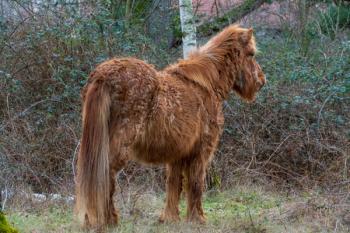
USDA issues decertification notice to horse industry organizations
Groups challenge amended regulations to Horse Protection Act regarding soring.
The 74th annual Tennessee Walking Horse National Celebration in Shelbyville, Tenn., took place in late August under a cloud of scrutiny surrounding the issue of soring and the notice of decertification of several horse industry organizations, including SHOW (which stands for "Sound horses," "Honest judging," "Objective inspections" and "Winning fairly"), by the U.S. Department of Agriculture (USDA).
SHOW, a horse industry organization licensed by the USDA to enforce industry regulations, received its decertification notification Aug. 6 because of a missed deadline. In June the USDA began requiring horse industry organizations to assess minimum penalties for violations of the federal Horse Protection Act (HPA), which prohibits soring—the act of irritating or blistering a horse's legs or feet through the use of chemicals or mechanical devices.
SHOW did not submit an amended rule book reflecting the new minimum-penalty protocols to federal officials, missing the July 9 deadline set by the USDA and opening itself up for decertification. SHOW is challenging the action, saying in a release that the USDA "does not enforce the rule consistently across the industry." SHOW claims it has the strictest inspection process and the strongest penalties in the industry.
However, the American Association of Equine Practitioners (AAEP) has issued a release stating that despite SHOW's claim of a 98.5 percent compliance rate with the Horse Protection Act at events it inspects, USDA swab tests on 52 horses at the 2011 Tennessee Walking Horse National Celebration resulted in 52 positive findings for foreign substances. It also states that 37 of the 52 horses tested positive for anesthetic agents used to mask pain from soring and that three of the seven judges for this year's Celebration have been cited for soring violations in the past. At press time, the USDA was reviewing inspection reports to tabulate data from this year's Celebration show.
"At USDA, we believe that one horse subjected to soring is one too many," USDA spokesman Dave Sacks told DVM Newsmagazine. "We will continue to enforce the Horse Protection Act fairly and equitably and to work with all interested stakeholders to make horse soring a thing of the past."
SHOW's ability to inspect horses at the Tennessee Walking Horse National Celebration was not affected by the notice of decertification, Sacks says. And while refusing to comply with USDA regulations, the Celebration board of directors did announce before the event that, for the first time, results of tests for masking agents and harmful substances would be made public during the show. Violations would lead to the removal of ribbons, trophies and prize money; trainers would have their licenses suspended; and horses would be disqualified. The board stated that the new measures were in addition to SHOW and USDA inspections and that this year would mark "the most intense and severely punished inspection of TWH and Celebration in history."
However, conflict with the USDA continued when the Tennessee Walking Horse Show Organization (TWHSO) posted a release in late August accusing USDA inspector Ernest Johnson, DVM, of wrongly disqualifying 10 horses at the Celebration. It disclosed an e-mail it says it obtained through the Freedom on Information Act between Johnson and APHIS coordinator Rachel Cezar, DVM, about behavior at shows. The TWHSO alleges that the disqualifications were malicious.
Sacks defends the actions of the USDA. "I can assure you that USDA has one and only one goal at the Celebration or any other horse show: to eliminate the cruel and inhumane practice of soring horses," he says. "Our regulations exist to ensure the welfare of the animals we regulate. Our inspectors do not falsely cite horses, and they do not target particular horses or riders. USDA fully stands behind the performance and conduct of all of our inspectors at the Celebration."
Ron DeHaven, DVM, MBA, executive vice president of the American Veterinary Medical Association (AVMA), says inspection by horse industry organizations creates an inherent conflict of interest. "We have a basic problem of the fox watching the hen house," he says. DeHaven spent part of his career with the USDA overseeing soring violations and performing inspections. "The disappointing thing is the act was passed 40 years ago," he says. "We're seeing a lot of it—too much of it—still going on."
The TWHSO and SHOW called on the AAEP and AVMA to join them for a "horse protection summit" to be scheduled sometime before the end of November. A joint release states, "The industry is calling on all concerned parties to join their reform efforts to ensure that all Tennessee Walking Horses are sound and in compliance with the Horse Protection Act."
At press time the invitation had gone unanswered by both organizations. "I am suspicious because rather than sending the invitation to the AVMA and AAEP, they did it in a public press release," DeHaven says. "They represent a relatively small group. I'm not sure any kind of agreement with them has much of an impact."
The AVMA was scheduled to meet with the undersecretary of the USDA on Oct. 1 to further discuss soring and regulatory oversight.
Newsletter
From exam room tips to practice management insights, get trusted veterinary news delivered straight to your inbox—subscribe to dvm360.




